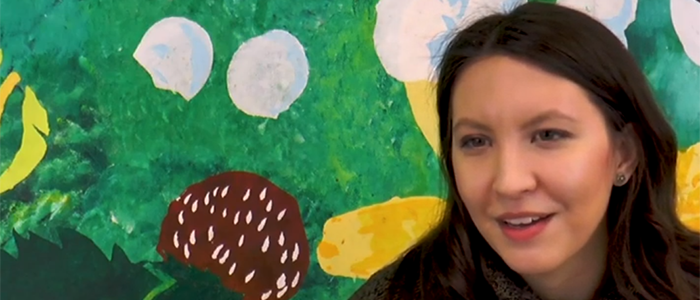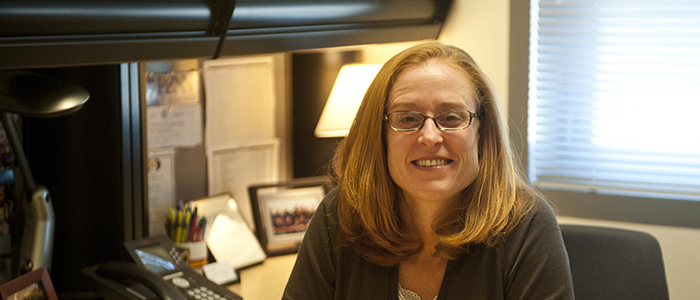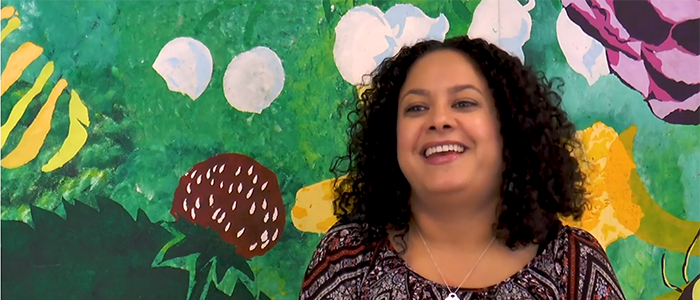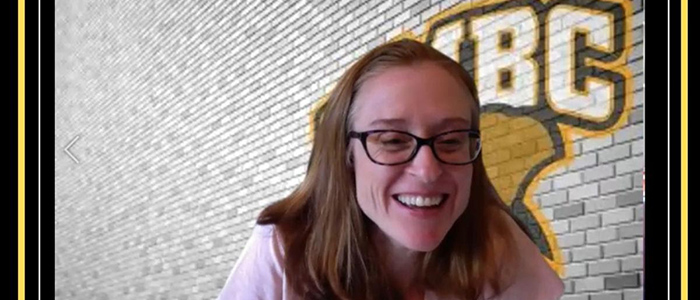UMBC’s Bachelor of Arts in Social Work offers a unique environment of small class sizes, close faculty and student collaboration, and a diverse student population. Our fully accredited program is responsible for preparing social work professionals in generalist practices with individuals, families, groups and communities through hands-on field placement and community outreach. More than 80 percent of graduates go on to graduate and professional schools. Additionally, many of our graduates work at mental health and addictions agencies, schools, shelters, community-based programs, prisons, health care and advocacy organizations.
Students enrolling in the Bachelor of Arts program in Social Work at UMBC-Shady Grove will complete approximately 45-60 credits study prior to entry and complete the remainder of their upper-level credits with UMBC-Shady Grove. Students may transfer a maximum of 60 credits from a community college and 90 credits from a four-year school to UMBC. Please visit UMBC's Social Work Program Student Guide to learn more about the social work curriculum and the field education component of our program.
Learn More About the Program
Program Highlights
One unique aspect of the UMBC Social Work Program is the field placement program, which provides an experiential learning opportunity for students to work in a local agency under the supervision of a social worker. The social work degree also provides a pathway to licensure at the bachelor’s level and opportunities for graduate studies with the optional advanced standing that recognizes the successful completion of an undergraduate social work degree. You can learn more about all the opportunities the UMBC Social Work Program affords by downloading the Social Work Program Highlights PDF.
Suggested Transfer Pathways
UMBC-Shady Grove has developed Suggested Transfer Pathways (STPs) for students at Montgomery College (updated version coming soon) and Frederick Community College (updated version coming soon), and Prince George's Community College who may be interested in transferring into any one of our undergraduate programs. In the meantime, please make use of our General Suggested Transfer Pathway. Our STPs provide an academic plan of action for transfer and an outline of the recommended transfer coursework specific to each of our academic programs.
Please note that the Suggested Transfer Pathway is not intended to serve as an official articulation agreement.
Recommended Prerequisites
UMBC-Shady Grove provides upper-level coursework for transfer students who have completed or are near completion of lower-level course requirements. As such, only upper-level courses are offered at UMBC-Shady Grove specific to each of our undergraduate programs. Most students transferring into UMBC-Shady Grove have completed at least 45-50 credits prior to transferring and many students have earned their Associate Degree. Please note that the Social Work Department requires a minimum 2.5 GPA for transfer to UMBC-Shady Grove. The Social Work Department also strongly encourages you to complete the following courses prior to transfer:
- Introduction to Sociology
- Introduction to Psychology
- English Composition
- General or Human Biology (with Lab)
- Statistics
- Political Science or Economics
In addition to the above courses, the following courses must be completed prior to graduation from UMBC. Ideally, a student will complete as many of the courses below as possible prior to transferring to UMBC-Shady Grove. Given that these courses are lower-level, they must be taken at an institution other than UMBC-Shady Grove:
- 3 Arts and Humanities courses (from at least two different disciplines)
- Statistics
- 1 Science (lab or non lab), in addition to General or Human Biology
OR - 2 Science courses, (at least one must have a lab component. General or Human Biology counts as 1 of 2 courses)
- World Language Intermediate-Level (consult advisor about exceptions)
Questions about the Social Work Program? Please contact Ms. Katie Morris, LCSW-C, Program Director, at kath@umbc.edu or 301-738-6312. Watch the short video below to meet Ms. Morris.
Major Requirements
Students pursuing a bachelor's degree must complete university requirements. Progress toward completion of university requirements is evaluated by means of the Transfer Credit Report (TCR) which is available online to students via myUMBC once admitted to the university. Progress toward major completion is evaluated in the academic departments. University requirements include:
General Requirements:
- Minimum of 120 academic credits
- Minimum of 2.0 grade point average (2.5 required for social work major)
- 45 Upper Level Credits
Major Requirements:
Major Requirements Specific to Social Work
Additional Advising Resources
Additional advising resources are available here. For more information on degree requirements, please contact the UMBC-Shady Grove Coordinator of Undergraduate Recruitment and Advising at 301-738-6281.
Minor Requirements
In addition to completing a major, UMBC social work students must complete a minor to supplement their coursework.
Please click on the links below for University requirements specific to minors requiring course work available at UMBC-Shady Grove. Other minor options may be explored as well. You should meet with your academic advisor to discuss how your minor of interest may best fit your degree plan.
Minor Requirements:
Faculty
Katherine Morris, MSW
Program Director
Department: Social Work
Phone: 301-738-6312
Email: kath@umbc.edu
Office: Bldg III, Room 4141
 Katherine Morris, M.S.W., is Program Director of Social Work at the Universities at Shady Grove in Rockville, MD. Ms. Morris has a B.A. in Psychology from the College of the Holy Cross in Worcester, MA and an M.S.W. from the University of Pennsylvania. Prior to her employment with UMBC, she worked as a therapist providing cognitive behavioral and motivational enhancement therapy to individuals with alcohol and substance dependence in Philadelphia. In 2001, Ms. Morris moved to Maryland and was employed as a therapist at a mental health rehabilitation program in Prince George's County, where she worked with individuals with persistent mental illness in individual and group settings. She currently teaches Information Technology in Social Work as well as the Methods sequence.
Katherine Morris, M.S.W., is Program Director of Social Work at the Universities at Shady Grove in Rockville, MD. Ms. Morris has a B.A. in Psychology from the College of the Holy Cross in Worcester, MA and an M.S.W. from the University of Pennsylvania. Prior to her employment with UMBC, she worked as a therapist providing cognitive behavioral and motivational enhancement therapy to individuals with alcohol and substance dependence in Philadelphia. In 2001, Ms. Morris moved to Maryland and was employed as a therapist at a mental health rehabilitation program in Prince George's County, where she worked with individuals with persistent mental illness in individual and group settings. She currently teaches Information Technology in Social Work as well as the Methods sequence.
Courses: SOWK 250: Introduction to Social Work; SOWK 397 (Methods 1)
Research/Clinical Interests: Enhancing student writing and student success among first generation and bilingual students
Faculty
Dr. M. Nicole Belfiore
Department: Social Work
Phone: 301-738-6282
Office: Bldg III, Room 4135
Courses: SOWK 260 (Introduction to Social Welfare, Social Policy, and Social Work) and SOWK 360 (Social Welfare, Social Policy, and Social Work II)
Research/Clinical Interests: Social work and societal ethics, social work education, community service and service learning in higher education, poverty
Lisa Harfoot
Courses: SOWK 389 (Human Behavior 2); SOWK 372 (Social Work and Healthcare)
Research/Clinical Interests: Aging and healthcare
Jeanette Hoover
Department: Social Work
Phone: 301-738-6108
Office: Bldg III, Room 4137
Courses: SOWK 388 (Human Behavior and the Social Environment 1); SOWK 481(Social Work Methods 2); SOWK 438 (Social Work Methods 3); and SOWK 386 ( Social Work Practice with Families)
Kathleen Leiser
Department: Social Work
Phone: 301-738-6304
Office: Bldg III, Room 4139
Courses: SOWK 480 (Field 1); SOWK 482 (Field 2)
Dr. Joshua Okundaye
Courses: SOWK 374: Social Work with Immigrants and Refugees
Research/Clinical Interests: Spirituality, addictive behaviors, immigrants and refugees
Diana Pina
Courses: SOWK 388 Human Behavior in the Social Environment
Research/Clinical Interests: Homelessness, policy, behavioral health, and supervision
Natalie Sanchez
Department: Social Work
Phone:240-665-6478
Office: Bldg III, Room 4139
Courses: SOWK 480: Field 1 and SOWK 482: Field 2
Research/Clinical Interests: Educational access and its impact on social and economic justice
Samantha Taylor
Courses: SOWK 388 Human Behavior in the Social Environment
Research/Clinical Interests: Spirituality, culture, healthcare, and geriatrics
Dr. Laura Ting
Courses: SOWK 397 (Methods 1); SOWK 470 (Social Work Research)
Research/Clinical Interests: Intimate partner violence, cross cultural issues, and substance use
Priscilla Villavicencio
Courses: SOWK 250: Introduction to Social Work
Research/Clinical Interests: Trauma, domestic violence, and children's mental health
What's Next?
Are you thinking about graduate school and wondering what steps to take? First, visit the Council on Social Work Education to learn more about the accredited social work programs to which you can apply. Then watch the Next Steps video which will help answer your questions and prepare you for what comes next in your social work career!



